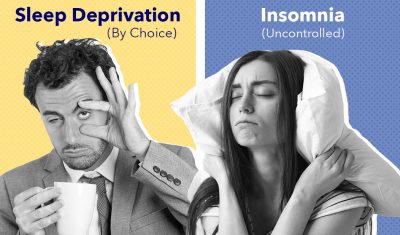11 Types of Insomnia — Causes and Treatments
- by Rose MacDowell
- Updated: June 22, 2023
Table of Contents
Insomnia sounds simple. It’s just the inability to fall asleep, right? Well, not exactly. Insomnia is the inability to fall asleep, stay asleep, fall back to sleep after waking, or all three. Insomnia can disturb sleep for a brief period of time or chronically, and may lead to long-term sleep debt.
Insomnia is by far the world’s most common sleep disorder (1), with potentially serious and wide-ranging effects. Chronic insomnia in particular can impact mental and physical health and have a detrimental impact on quality of life. Here at Sleepopolis we’re dedicated to helping you get a healthy night of sleep, part of that is by finding the best mattress for you, but another part is by educating you on why you might be having a tough time falling asleep in the first place.
Note: The content on Sleepopolis is meant to be informative in nature, but it shouldn’t take the place of medical advice and supervision from a trained professional. If you feel you may be suffering from any sleep disorder or medical condition, please see your healthcare provider immediately.
Transient Insomnia or Chronic Insomnia?
As many as a third of adults suffer from insomnia at some point in their lives. Insomnia is more common in older adults, and is especially prevalent in pregnant women, people under stress, and those suffering from mental illness.(2)
Though insomnia may appear to be a relatively straightforward disorder, it is actually quite complex. Insomnia can come and go throughout life depending on health, stress levels, and family and employment circumstances. Insomnia may be brief and relatively manageable, or chronic and more challenging to treat. Possible effects of insomnia include:
- Fatigue,
- Poor memory
- Decreased productivity
- Depression or irritability
- Impaired decision-making
- Low motivation
Transient acute insomnia is a period of sleep difficulty lasting three months or less. The relatively brief duration of transient insomnia distinguishes it from chronic insomnia. (3) Transient insomnia usually resolves on its own without treatment. Symptoms range from an inability to fall asleep to daytime sleepiness to early morning waking. (4) Causes may include the following:
- Jet lag
- Anxiety
- Medication side effects
- Short-term illness
- Grief
Transient acute insomnia is often triggered by a significant life event, such as a move, job change, or divorce. (5) Physical changes may also be a factor. Adjustment to a higher altitude can disrupt sleep, as can pregnancy, menopause, and post-surgical pain.
FAQ
Q: What causes insomnia during pregnancy? A: Hormonal shifts, irregular sleep schedules, physical discomfort, and frequent bathroom trips are common causes of insomnia during pregnancy.Chronic insomnia refers to a longer-term pattern of problematic sleeping. (6) Chronic insomnia can develop from the anxiety of transient insomnia, and become a persistent issue.
The definition of chronic insomnia is difficulty sleeping that lasts longer than three months, three or more nights each week. Chronic insomnia affects around ten percent of American adults. (7) When insomnia symptoms become chronic, they are typically triggered by:
- A conditioned negative response to the attempt to sleep and/or the sleeping environment
- Head injuries or certain medical conditions (8)
- Hyperarousal of the sympathetic nervous system, leading to excess release of stress hormones (9)
Due to its duration, chronic insomnia can have significant health effects, such as diminished alertness, greater risk of injury, cognitive impairment, and metabolic changes. Work and relationships may be impacted, and quality of life reduced.
Though the Diagnostic and Statistical Manual of Mental Disorders, Fifth Edition does not distinguish between specific causes of insomnia, it can be helpful to break the disorder into sub-types to understand how it might be experienced by sufferers. Beyond the big umbrella terms of transient and chronic insomnia, what types of insomnia should we be aware of?
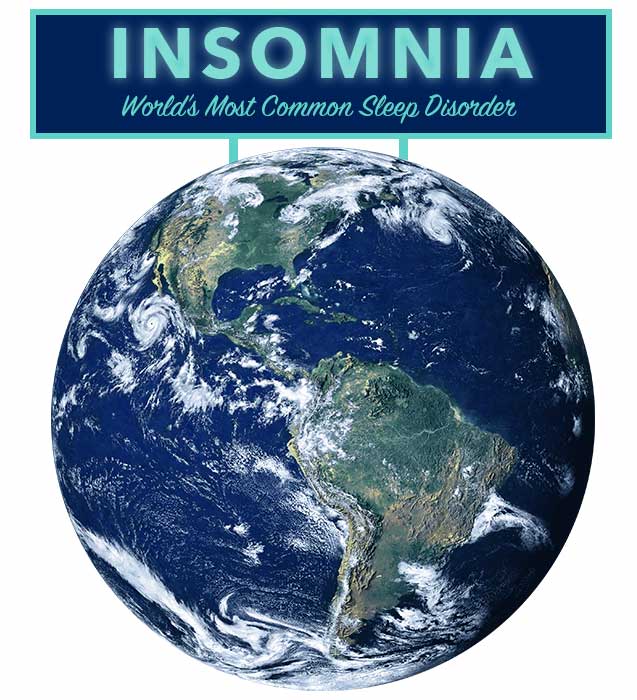
Adjustment Insomnia
Adjustment insomnia describes a period of insomnia symptoms linked to a life event. Stress, anxiety, or lack of familiarity are frequent underlying factors. The terms “adjustment insomnia” and “acute insomnia” are sometimes used interchangeably, as causes may be similar.
Approximately 20% of people experience adjustment insomnia each year. The symptoms usually resolve when the sufferer learns to cope with the triggering issue, which may be positive or negative. Common causes include:
- Starting at a new job or school
- Moving to a new home
- Marriage or divorce
- Birth or adoption of a child or pet
Drug or Substance-Induced Insomnia
This type of insomnia refers to difficulty sleeping caused by medication or recreational drug use. Though the most frequent offender is caffeine, sleep can also be adversely affected by alcohol, cold medications, opioids, ADHD treatments, and cannabis.

Cannabis can help some users fall asleep but markedy increase alertness in others. (10) Studies show that cannabis reduces the time spent in the rapid eye-movement stage of sleep, or REM, when most dreaming occurs. Insomnia symptoms are common during withdrawal from habitual cannabis use. Stimulants such as cocaine and amphetamines can decrease REM and slow wave sleep and damage the circadian rhythm, in some cases permanently.
Like cannabis, CBD can have a calming effect on some users with insomnia and a stimulating effect on others. More research is needed to determine how CBD impacts insomnia, and whether its effects are dependent on dosage, the physiology of the user, or formulation.
Drugs and medications may lead directly to disrupted sleep, or induce other disorders, such as:
- Sleep-eating
- Nightmare disorder
- Parasomnias like sleep paralysis and exploding head syndrome (11)
- Restless leg syndrome
- REM sleep behavior disorder
Some drug users begin a damaging cycle of taking stimulant drugs to remain awake and sedative drugs to sleep. Users can also experience rebound and withdrawal insomnia once they stop using drugs. Abusers of alcohol and opiates are particularly susceptible to these types of insomnia symptoms, which can persist for weeks.
Nicotine, both smoked and vaporized, is a powerful vasoconstrictor and common cause of sleep disruptions. (12) Nicotine raises the risk of sleep apnea, another sleep disorder that can contribute to insomnia. Insomnia symptoms can also be triggered by quitting nicotine. This occurs because nicotine is both a stimulant and mood-modulator, which means it can have a calming effect on users. (13)
Prednisone, a steroid commonly used to treat inflammation and pain, is known to cause restlessness and disturbed sleep. Inhaled drugs for asthma and other respiratory conditions can contribute to insomnia, as well.
Alcohol is one of the most common causes of middle insomnia, which refers to waking during the night and being unable to get back to sleep. When alcohol’s depressant effects wear off several hours after going to bed, users may wake up and find returning to sleep difficult. (14)
Depressant
A drug that lowers activity in the central nervous system.
Comorbid Insomnia
Comorbid insomnia occurs along with another illness or disorder. The most common conditions that trigger comorbid insomnia symptoms are psychiatric issues like anxiety, depression, and bipolar disorder. Comorbid insomnia can also occur as a result of conditions that cause chronic pain, including:
- Arthritis
- Cancer
- Shingles
- Injury from gunshot wounds
- Migraine headaches
- Fibromyalgia and other autoimmune diseases
Neurologic disorders such as dementia can disrupt the circadian rhythm and cause sleep difficulties. The pain and nausea of migraines may also cause insufficient sleep. (15) People with Tourette’s Syndrome or other movement disorders can experience tics during all stages of sleep, and experience insomnia symptoms as a result. (16)
Insomnia symptoms can become an issue at end of life due to factors like pain, medications, a noisy hospital environment, depression, or anxiety. Common terminal illnesses including cancer and end-stage renal disease may require treatments that prevent refreshing or undisturbed sleep. (17)
Onset, Middle, and Late Insomnia describe the time of night when insomnia symptoms occur. Insomnia sufferers can experience one, two, or all three stages, regardless of the trigger of their symptoms.
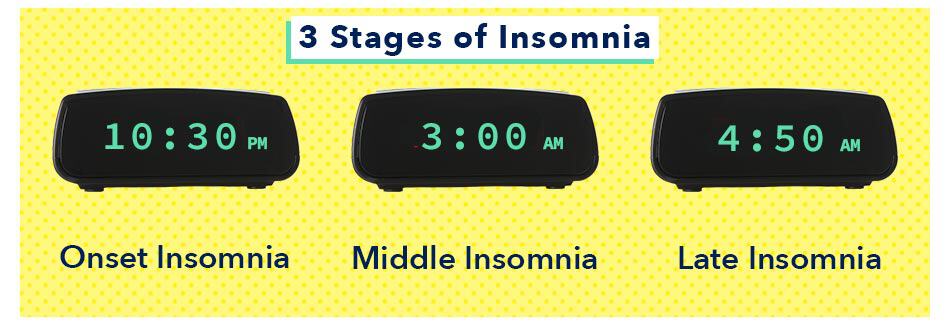
Onset Insomnia
Onset insomnia describes difficulty falling asleep at the beginning of the night, or the point of “sleep onset.” This type of insomnia is characterized by a delay in sleep that lasts more than thirty minutes.
Causes of onset insomnia may include stress, consumption of alcohol or caffeine, poor sleep hygiene such as electronics usage before bed, and illness. The disorder is particularly associated with anxiety and stress. It can be temporary, acute, or chronic, and occur alone or along with middle and/or late insomnia.
Middle Insomnia
Middle insomnia, also known as maintenance insomnia, refers to difficulty staying asleep. Sufferers wake once or more often during the night and have trouble getting back to sleep. Middle insomnia is often associated with alcohol use, disorders that cause chronic pain, and babies who awaken for middle-of-the-night feedings.
One common cause of middle insomnia is menopause. (18) Because estrogen facilitates the functioning of essential neurotransmitters involved with sleep, declining levels of this hormone can disturb circadian rhythms. Hot flashes may disrupt sleep, while life transitions and career pressures can contribute to insomnia, as well. Perimenopause, which occurs in the years before menopause, can trigger sleep difficulties due to changing levels of estrogen and progesterone.
Middle insomnia may occur in conjunction with other sleep disorders such as restless leg syndrome or sleep apnea. These disorders often disrupt sleep repeatedly, in some cases up to ninety times each night. REM sleep behavior disorder, in which the normal muscle paralysis of REM sleep is absent, can cause frequent awakening due to the physical acting out of dreams.
FAQ
Q: What is restless legs syndrome? A: Restless legs syndrome is a sleep disorder that causes uncomfortable physical sensations resulting in a strong urge to move the limbs.Late Insomnia
If you’ve ever awakened too early and had trouble falling back to sleep, you may have experienced late insomnia. Late insomnia, also termed sleep offset or terminal insomnia, tends to occur between 3 and 5 am, when it feels too early to get up but too late to go back to sleep. (19)
A diagnosis of late insomnia requires waking thirty minutes early or more at least three days a week. This type of insomnia is a common symptom of clinical depression. Other contributing factors include:
- Low blood sugar or hunger
- Changes in room temperature
- Allergies
- Emotional stress
- Noise or light
Conditioned, or Psychophysiological Insomnia
This type of sleep disorder occurs when insomnia becomes a conditioned reaction to going to bed. This response is usually the underlying mechanism behind chronic insomnia. Sufferers often experience an event that causes insomnia symptoms, but once the trigger is removed, the insomnia remains.
Conditioned insomnia is more common in women, and can occur in conjunction with health anxiety. Normal preparations for sleep like showering and switching off lights can induce a conditioned response of fear or anxiety, which is worsened by the release of stress hormones. Lack of sleep may become a habit, along with the fear of being unable to sleep. The cycle can continue for months or years unless diagnosed and treated.
Recent research into conditioned insomnia reveals evidence of nervous system hyperarousal. Hyperarousal can represent an exaggerated stress response that continues during sleep, resulting in elevated blood pressure and increased emotional reactivity. An exaggerated stress response can be the result of conditioned insomnia or the cause of it. Hyperarousal, stress, and insomnia may become a vicious circle, worsening both anxiety and sleep difficulties. (20)
Behavioral Insomnia Of Childhood

Behavioral insomnia begins when a child is not given a strict or specific bedtime. Children who suffer from this sleep disorder are typically under five years old. Without regular sleep habits or routines, they struggle to fall or stay asleep. Needing to sleep with a parent can be another common trigger. If allowed to continue, symptoms can last into adulthood and affect sleeping habits over the long term.
Most children between three and five years old require about twelve hours of sleep, plus naps. Children with this form of insomnia may get much less, leading to other symptoms of insomnia, such as daytime sleepiness, hyperactivity, and aggression.
Untreated behavioral insomnia can cause issues beyond sleep, including diminished performance at school and temper tantrums. Inconsistent bedtimes may compound the problem of behavioral insomnia by disturbing a child’s circadian rhythm. As many as 25% of children experience behavioral insomnia during their first five years of life. (21)
Childhood behavioral insomnia is divided into two types: limit-setting and sleep-onset association. Both types involve anxiety around the idea of going to sleep. They are similar to conditioned insomnia, but occur in children.
Limit-setting insomnia involves defiance by the child of specific bedtimes or bedtime routines. Children might delay going to bed using such methods as crying, asking to go the bathroom, or requesting food or water. (22) The sleep-onset form of this disorder involves a negative association with bedtime. The negative association may begin when a pleasurable activity such as game-playing or television-watching is stopped because the child must go to sleep. The child may also have become used to rocking, story-time, or sleeping with a parent, and is reluctant to go to sleep if these routines change.
Sleep-onset disorder might be more than a matter of sleep-related anxiety. This type of childhood insomnia is sometimes associated with common behavioral issues such as attention deficit/hyperactivity disorder.
Attention deficit/hyperactivity disorder
A disorder that typically begins in childhood, characterized by difficulty paying attention and controlling certain behaviors.
Idiopathic Insomnia
Idiopathic insomnia describes insomnia with no apparent cause, such as a medical or psychological condition. However, recent research has found that the disorder likely does have a cause: hyperarousal of the central nervous system. This could be a dysregulated response to stress by the body, which can remain hypervigilant at bedtime, making sleep difficult. Metabolic rate, heart rate, and body temperature may rise, as well, contributing to insufficient sleep. (23)
In some individuals, stress may activate emotional regulatory centers involved in sleep, such as the amygdala. Sleep studies have shown insomnia of all types in people with hyperaroused central nervous systems. These continued responses to stress, even in sleep, may be the cause of insomnia cases once considered idiopathic, or “of no known cause.”
Paradoxical Insomnia
Paradoxical insomnia (or pseudo-insomnia) is a form of insomnia in which ia person is actively sleeping, but feels as if they aren’t. Sufferers overestimate how long it takes to fall asleep or the amount of time they spend awake. People who complain of the disorder also tend to underestimate the time they spend asleep.
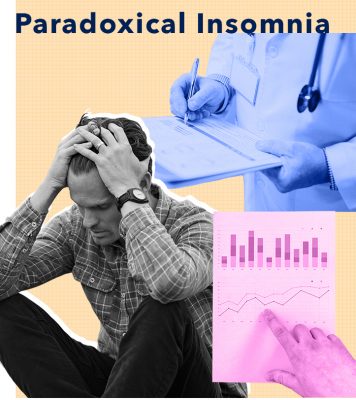
Sleep studies of paradoxical insomnia sufferers reveal normal sleep/wake patterns, with normal onset and efficiency of sleep. Though people with the disorder feel that they get very little sleep or spend hours lying awake, they do not actually experience insomnia.
Unsurprisingly, physical effects of paradoxical insomnia are not as severe as they are in other types of insomnia. Psychological effects can be profound, resulting in anxiety, repeated visits to doctors, and multiple rounds of sleep testing. (24)
Sleep Hygiene Insomnia
This refers to insomnia caused by poor sleep hygiene. It might refer to unproductive sleep habits, such as using electronics just before trying to sleep, drinking coffee or alcohol in the evening, or having a poor bedtime routine. Sleep hygiene insomnia is one of the most common forms of insomnia, and one of the most treatable.
Sleep hygiene insomnia may be the result of one poor sleep habit, or many. An inconsistent bedtime might be enough to disrupt circadian rhythms and cause difficulty sleeping. A new pet or baby can interrupt or delay sleep, as can external noise and bright light.
Sleep hygiene insomnia has become more common with the increasing use of electronics at night. Bright light during the evening can increase the chance of experiencing insomnia, even if other aspects of sleep hygiene are followed. (25)
Treatments for Insomnia
Treatment for insomnia falls into three broad categories: sleep hygiene, therapy, and medication. A doctor might suggest one or more forms of treatment, depending on the cause of the disorder, age of the patient, or underlying medical condition.
Cognitive Behavioral Therapy, or CBT-I
One of the most effective chronic insomnia treatments is reducing the number of hours spent in bed. This type of treatment is part of the Cognitive Behavior Therapy protocol for chronic insomnia, which includes:
1. Sleep restriction. Sleep restriction requires limiting the time spent in bed to the number of hours typically spent asleep. For example, if you usually spend eight hours in bed but lie awake for two, sleep restriction therapy might require you to go to bed at midnight and get up at 6 am. Going to bed later is recommended during treatment, rather than getting up earlier than your normal time.
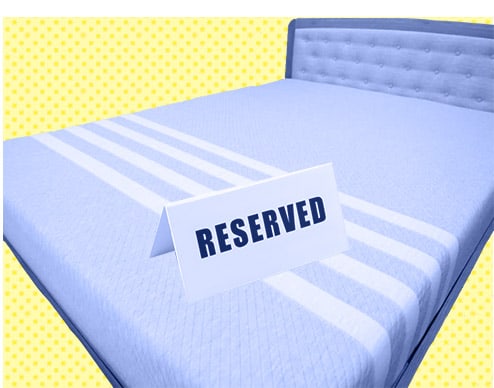
Though it may seem as if it would compound insomnia, sleep restriction therapy increases sleep efficiency and reduces waking during the night. Once someone undergoing training is sleeping well for six hours, 15-minute blocks may be added to the time spent in bed and increased gradually until the person feels fully rested during the day.
2. Relaxation training. Relaxation training utilizes meditation techniques, guided imagery, and breathing exercises to prepare the body for sleep. Biofeedback helps patients learn to control the body’s normally involuntary bodily processes, such as heart rate, blood pressure, and muscle tension. This combination of methods helps relax the body, calm the mind, and make falling asleep easier.
3. Cognitive Restructuring. This aspect of the protocol involves challenging negative beliefs about sleep, and replacing fearful associations with positive thinking. Worrying might be limited to a certain time of day to make bedtime more relaxing. Insomnia sufferers learn to manage stress and control the over-active thought process that contributes to sleep difficulties.
4. Stimulus control training. Stimulus control helps chronic insomnia sufferers reduce negative associations with sleep and bedtime. (26) Training essentials include:
- Lying down in bed only when sleepy
- Using the bed for sleep and sex only
- Getting up after 20 minutes if you can’t fall asleep, returning to bed when sleepy and repeating if necessary
- Getting up at the same time every morning
- Foregoing naps
This protocol can train the brain to associate a particular time and environment with sleep, and break the psychological onditioning that causes disturbed sleep.
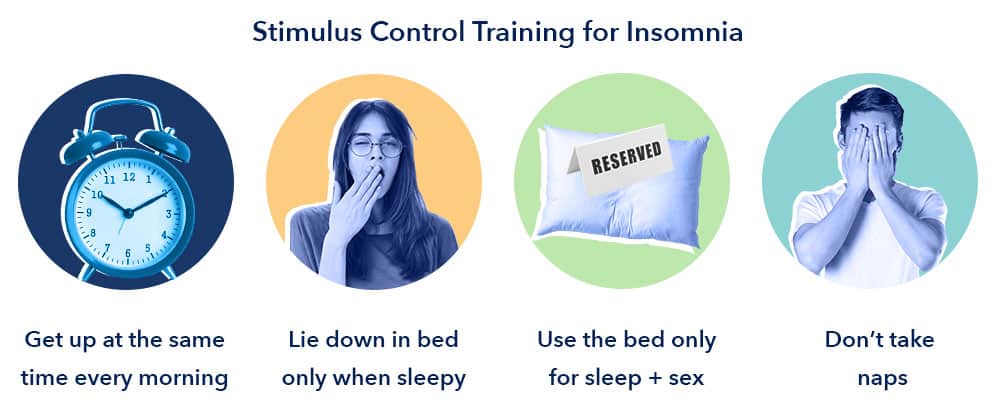
Another type of therapy is called paradoxical intention, a treatment that involves lying passively awake while not worrying about or attempting to sleep. This can help to decrease conditioned responses to bedtime, such as anxiety and restlessness.
A behavioral sleep medicine specialist may be helpful for children with behavioral insomnia. For paradoxical insomnia, therapy and reassurance can help sufferers attain more restful sleep. (27)
Sleep Hygiene
Sleep hygiene refers to habits and routines surrounding your sleep habits. (28) Good sleep hygiene may be one of the simplest and most effective remedies for mild insomnia symptoms. Good sleep hygiene essentials include:
- Maintaining a regular sleep-wake schedule
- Limiting naps
- Exercising regularly to improve sleep quality
- Reducing blue light exposure from electronics before bedtime
- Making sure the bedroom is cool, dark, and quiet
- Avoiding alcohol, caffeine, or heavy meals before bed
A healthy change in sleep habits can reset the body’s biological clock, train the brain to associate a particular environment with sleep, and eliminate disruptions that cause fragmented sleep.
FAQ
Q: What's the origin of sleep hygiene? A: The term was first used in th 1930's, but was popularized in 1977 by a psychologist describing behavior intended to improve sleep.Medication
Medication can be an effective treatment for insomnia if used for a brief time under a doctor’s care. Most medical professionals do not recommend long-term use of insomnia medications, which may cause tolerance over time.
Some insomnia medications have the potential for abuse or side effects, such as daytime drowsiness, memory loss, dizziness, headache, or odd behaviors such as eating while asleep.
There are several classes of medications that treat insomnia, including:
- Antidepressants
- Hypnotics and sedatives (29):
- Antihistamines
- Natural treatments and herbal remedies
Insurance coverage of medications can vary according to type of medication and insurer, and may be limited to a certain number of pills per week or month. Use of sleeping pills usually requires the ability to get a full night’s sleep, as well as avoidance of alcohol, driving, and operating machinery. Sleep medications do not treat the underlying causes of insomnia, which can persist after medications are stopped.
Last Word From Sleepopolis
Insomnia is a complex sleep disorder with myriad causes and symptoms. It is also one of the most treatable sleep disorders, and one of the most responsive to the cognitive behavioral therapy for insomnia protocol. Most of us will experience at least one form of insomnia in our lifetimes, but with proper treatment and understanding of the disorder, insomnia doesn’t have to keep us awake at night. Also, be sure to check out a few of our roundups if you’re on the lookout for a new mattress:
References
- Evelyn Mai, MD. Insomnia: Prevalence, Impact, Pathogenesis, Differential Diagnosis, and Evaluation, Sleep Medicine Clinician, October 16, 2008
- Jodi A. Mindell, Sleep Patterns and Sleep Disturbances Across Pregnancy, Sleep Medicine, April 2015
- Yang, C M, et al. Transient Insomnia versus Chronic Insomnia: a Comparison Study of Sleep-Related Psychological/Behavioral Characteristics. Current Neurology and Neuroscience Reports., U.S. National Library of Medicine, Oct. 2013
- Jason G. Ellis, Acute insomnia: Current conceptualizations and future directions, Sleep Medicine Reviews, February 13, 2011
- Sinha, Smit. Trauma-Induced Insomnia: A Novel Model for Trauma and Sleep Research. NeuroImage, Academic Press, 4 Feb. 2015
- Saddichha S.Diagnosis and treatment of chronic insomnia, Annals of Indian Academy Neurol. 2010 Apr.13
- Karl Doghramji, MD, The Epidemiology and Diagnosis of Insomnia. AJMC, April 15, 2006
- David Katz, MD, Clinical Correlates of Insomnia in Patients With Chronic Illness. JAMA and the Specialty Journals of the American Medical Association, 25 May 1998
- Alexandros N. Vgontzas, Chronic Insomnia and Activity of the Stress System: A Preliminary Study. Journal of Psychosomatic Research, July 1998
- Anthony N. Nicholson, Effect of Delta-9-tetrahydrocannabinol and Cannabidiol on Nocturnal Sleep and Early-morning Behavior in Young Adults, Journal of Clinical Psychopharmacology, 2004
- John A. Fleetham, Parasomnias, CMAJ, May 13, 2014
- Wetter DW and Young TB. The Relation Between Cigarette Smoking and Sleep Disturbance. National Center for Biotechnology Information, May 23, 1994
- Jean-G Gehricke, Nicotine-induced Brain Metabolism Associated with Anger Provocation. Behavioral and Brain Functions, April 24, 2009
- Timothy Roehrs, Sleep, Sleepiness, and Alcohol Use. National Institute on Alcohol Abuse and Alcoholism
- Jennifer Molano, MD, Approach to insomnia in patients with dementia, Neurology Clinical Practice, Feb, 4, 2014
- S. Cohrs, Decreased Sleep Quality and Increased Sleep Related Movements in Patients with Tourette’s Syndrome. Journal of Neurology, Neurosurgery & Psychiatry, 1 Feb. 2001
- M H Khemlani MD., Insomnia in Palliative care, Palliative Medicine Grand Round, Oct. 2008
- Philip S. Eichling, Menopause Related Sleep Disorders, Journal of Clinical Sleep Medicine, 2005
- Lavinia Fiorentino, Awake at 4 A.m.: Treatment of Insomnia With Early Morning Awakenings Among Older Adults. Journal of Clinical Psychology, November, 2010
- Bastien CH, St-Jean G, Morin CM, Turcotte I, Carrier J., Chronic Psychophysiological Insomnia: Hyperarousal And/or Inhibition Deficits? An ERPs Investigation. Sleep, June 1, 2008
- Lisa J. Meltzer, Clinical Management of Behavioral Insomnia of Childhood: Treatment of Bedtime Problems and Night Wakings in Young Children. Behavioral Sleep Medicine, June 24, 2010
- Jennifer Vriend, Clinical management of behavioral insomnia of childhood, Psychology Research and Behavior Management, June 24, 2011
- DA Kalmbach, Hyperarousal and Sleep Reactivity in Insomnia: Current Insights, Dove Press, April 10, 2018
- Liao J, Zhu S, Li X., Anxiety and Depression in Paradoxical Insomnia: a Case-control Study, Neuropsychiatric Disease and Treatment, Jan. 8, 2018
- Akacem LD, Wright KP Jr, LeBourgeois MK., Sensitivity of the Circadian System to Evening Bright Light in Preschool-age Children, Physiological Reports, March 2018
- J. Harris, A Randomized Controlled Trial of Intensive Sleep Retraining (ISR): A Brief Conditioning Treatment for Chronic Insomnia, Sleep, January 1, 2012
- James D. Geyer, Sleep Education for Paradoxical Insomnia, Behavioral Sleep Medicine, Sept. 30, 2011
- James K. Wyatt, Use of sleep hygiene in the treatment of insomnia, Sleep Medicine Reviews, June 2003
- Janette D. Lie, Pharmacological Treatment of Insomnia, Pharmacy & Therapeutics, November, 2015
Subscribe Today!
Get the latest deals, discounts, reviews, and giveaways!

